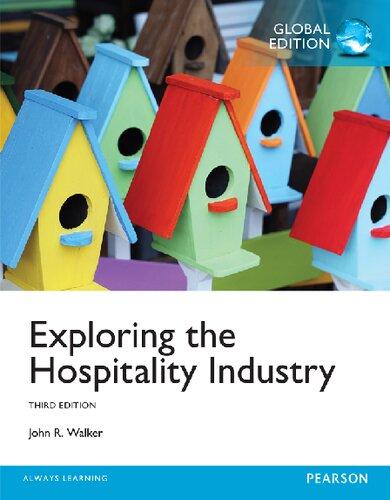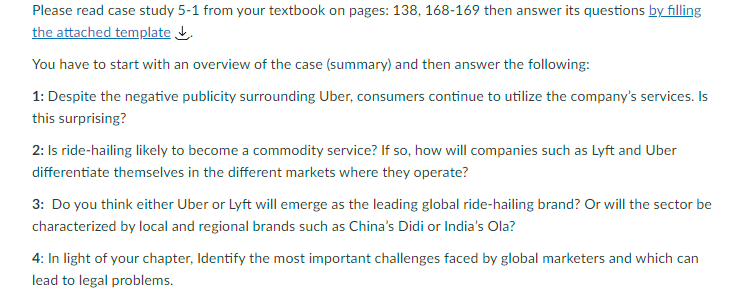
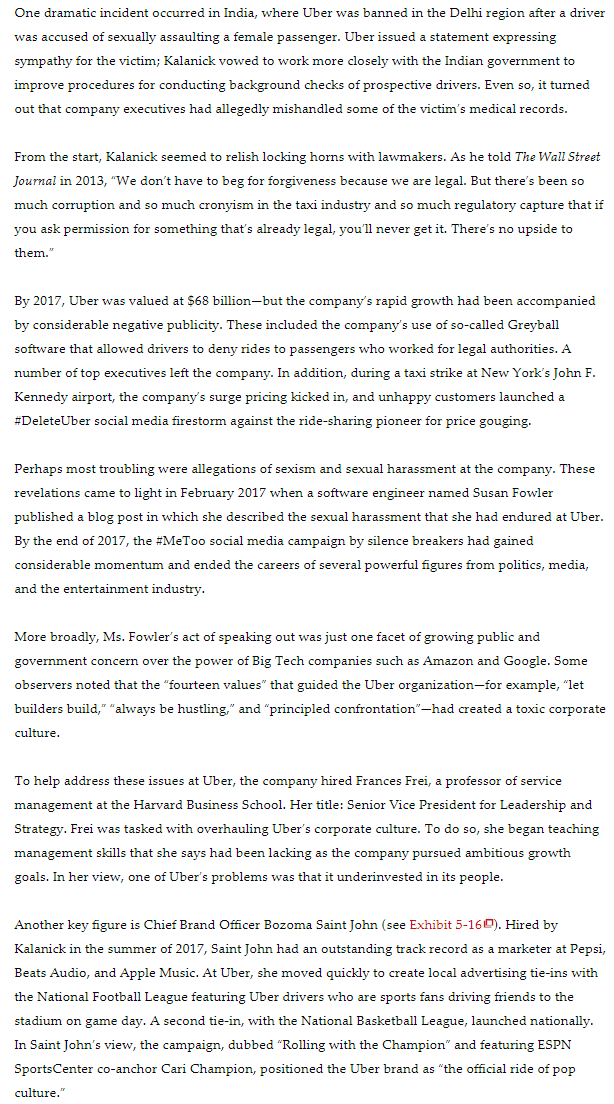
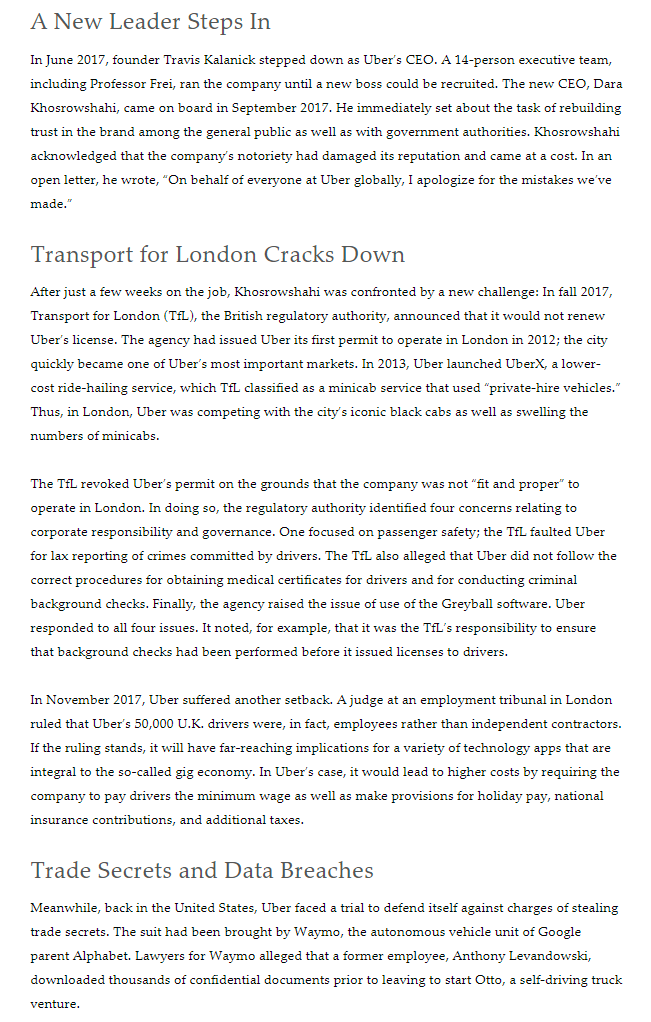
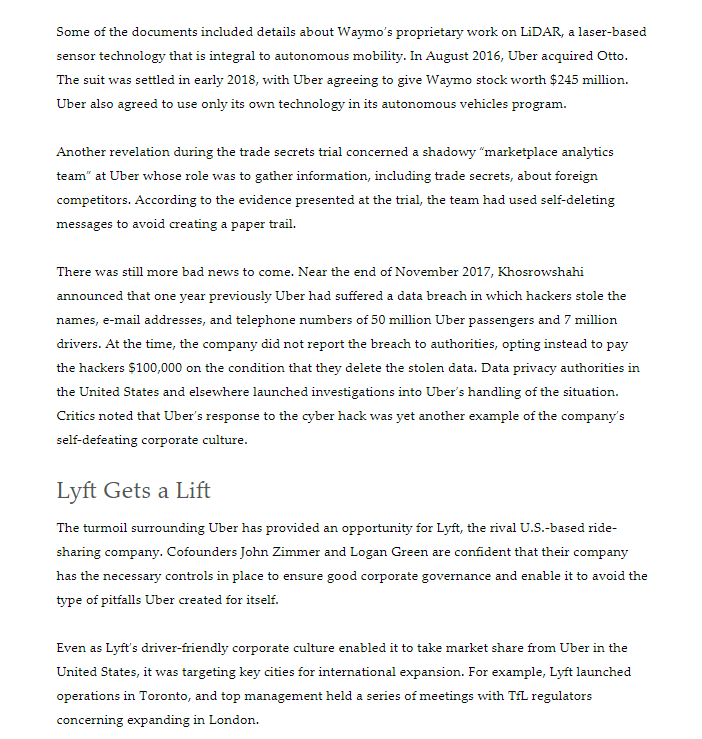
Please read case study 5-1 from your textbook on pages: 138,168169 then answer its questions by filling the attached template . You have to start with an overview of the case (summary) and then answer the following: 1: Despite the negative publicity surrounding Uber, consumers continue to utilize the company's services. Is this surprising? 2: Is ride-hailing likely to become a commodity service? If so, how will companies such as Lyft and Uber differentiate themselves in the different markets where they operate? 3: Do you think either Uber or Lyft will emerge as the leading global ride-hailing brand? Or will the sector be characterized by local and regional brands such as China's Didi or India's Ola? 4: In light of your chapter, Identify the most important challenges faced by global marketers and which can lead to legal problems. One dramatic incident occurred in India, where Uber was banned in the Delhi region after a driver was accused of sexually assaulting a female passenger. Uber issued a statement expressing sympathy for the victim; Kalanick vowed to work more closely with the Indian government to improve procedures for conducting background checks of prospective drivers. Even so, it turned out that company executives had allegedly mishandled some of the victim's medical records. From the start, Kalanick seemed to relish locking horns with lawmakers. As he told The Wall Street Journal in 2013, "We don't have to beg for forgiveness because we are legal. But there's been so much corruption and so much cronyism in the taxi industry and so much regulatory capture that if you ask permission for something that's already legal, you'll never get it. There's no upside to them." By 2017, Uber was valued at $68 billion-but the company's rapid growth had been accompanied by considerable negative publicity. These included the company's use of so-called Greyball software that allowed drivers to deny rides to passengers who worked for legal authorities. A number of top executives left the company. In addition, during a taxi strike at New York's John F. Kennedy airport, the company's surge pricing kicked in, and unhappy customers launched a \#DeleteUber social media firestorm against the ride-sharing pioneer for price gouging. Perhaps most troubling were allegations of sexism and sexual harassment at the company. These revelations came to light in February 2017 when a software engineer named Susan Fowler published a blog post in which she described the sexual harassment that she had endured at Uber. By the end of 2017, the \#MeToo social media campaign by silence breakers had gained considerable momentum and ended the careers of several powerful figures from politics, media, and the entertainment industry. More broadly, Ms. Fowler's act of speaking out was just one facet of growing public and government concern over the power of Big Tech companies such as Amazon and Google. Some observers noted that the "fourteen values" that guided the Uber organization-for example, "let builders build," "always be hustling," and "principled confrontation"-had created a toxic corporate culture. To help address these issues at Uber, the company hired Frances Frei, a professor of service management at the Harvard Business School. Her title: Senior Vice President for Leadership and Strategy. Frei was tasked with overhauling Uber's corporate culture. To do so, she began teaching management skills that she says had been lacking as the company pursued ambitious growth goals. In her view, one of Uber's problems was that it underinvested in its people. Another key figure is Chief Brand Officer Bozoma Saint John (see Exhibit 5-16 [). Hired by Kalanick in the summer of 2017, Saint John had an outstanding track record as a marketer at Pepsi, Beats Audio, and Apple Music. At Uber, she moved quickly to create local advertising tie-ins with the National Football League featuring Uber drivers who are sports fans driving friends to the stadium on game day. A second tie-in, with the National Basketball League, launched nationally. In Saint John's view, the campaign, dubbed "Rolling with the Champion" and featuring ESPN SportsCenter co-anchor Cari Champion, positioned the Uber brand as "the official ride of pop culture." A New Leader Steps In In June 2017, founder Travis Kalanick stepped down as Uber's CEO. A 14-person executive team, including Professor Frei, ran the company until a new boss could be recruited. The new CEO, Dara Khosrowshahi, came on board in September 2017. He immediately set about the task of rebuilding trust in the brand among the general public as well as with government authorities. Khosrowshahi acknowledged that the company's notoriety had damaged its reputation and came at a cost. In an made." Transport for London Cracks Down After just a few weeks on the job, Khosrowshahi was confronted by a new challenge: In fall 2017, Transport for London (TfL), the British regulatory authority, announced that it would not renew Uber's license. The agency had issued Uber its first permit to operate in London in 2012; the city quickly became one of Uber's most important markets. In 2013, Uber launched UberX, a lowercost ride-hailing service, which TfL classified as a minicab service that used "private-hire vehicles." Thus, in London, Uber was competing with the city's iconic black cabs as well as swelling the numbers of minicabs. The TfL revoked Uber's permit on the grounds that the company was not "fit and proper" to operate in London. In doing so, the regulatory authority identified four concerns relating to corporate responsibility and governance. One focused on passenger safety; the TfL faulted Uber for lax reporting of crimes committed by drivers. The TfL also alleged that Uber did not follow the correct procedures for obtaining medical certificates for drivers and for conducting criminal background checks. Finally, the agency raised the issue of use of the Greyball software. Uber responded to all four issues. It noted, for example, that it was the TfL's responsibility to ensure that background checks had been performed before it issued licenses to drivers. In November 2017, Uber suffered another setback. A judge at an employment tribunal in London ruled that Uber's 50,000 U.K. drivers were, in fact, employees rather than independent contractors. If the ruling stands, it will have far-reaching implications for a variety of technology apps that are integral to the so-called gig economy. In Uber's case, it would lead to higher costs by requiring the company to pay drivers the minimum wage as well as make provisions for holiday pay, national insurance contributions, and additional taxes. Trade Secrets and Data Breaches Meanwhile, back in the United States, Uber faced a trial to defend itself against charges of stealing trade secrets. The suit had been brought by Waymo, the autonomous vehicle unit of Google parent Alphabet. Lawyers for Waymo alleged that a former employee, Anthony Levandowski, downloaded thousands of confidential documents prior to leaving to start Otto, a self-driving truck venture. Some of the documents included details about Waymo's proprietary work on LiDAR, a laser-based sensor technology that is integral to autonomous mobility. In August 2016, Uber acquired Otto. The suit was settled in early 2018 , with Uber agreeing to give Waymo stock worth $245 million. Uber also agreed to use only its own technology in its autonomous vehicles program. Another revelation during the trade secrets trial concerned a shadowy "marketplace analytics team" at Uber whose role was to gather information, including trade secrets, about foreign competitors. According to the evidence presented at the trial, the team had used self-deleting messages to avoid creating a paper trail. There was still more bad news to come. Near the end of November 2017, Khosrowshahi announced that one year previously Uber had suffered a data breach in which hackers stole the names, e-mail addresses, and telephone numbers of 50 million Uber passengers and 7 million drivers. At the time, the company did not report the breach to authorities, opting instead to pay the hackers $100,000 on the condition that they delete the stolen data. Data privacy authorities in the United States and elsewhere launched investigations into Uber's handling of the situation. Critics noted that Uber's response to the cyber hack was yet another example of the company's self-defeating corporate culture. Lyft Gets a Lift The turmoil surrounding Uber has provided an opportunity for Lyft, the rival U.S.-based ridesharing company. Cofounders John Zimmer and Logan Green are confident that their company has the necessary controls in place to ensure good corporate governance and enable it to avoid the type of pitfalls Uber created for itself. Even as Lyft's driver-friendly corporate culture enabled it to take market share from Uber in the United States, it was targeting key cities for international expansion. For example, Lyft launched operations in Toronto, and top management held a series of meetings with TfL regulators concerning expanding in London










